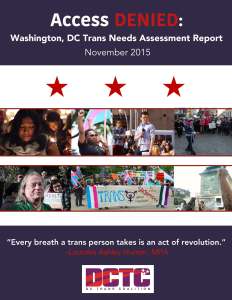Today we’re excited to release the results of the largest local-level survey of transgender, transsexual, and gender non- conforming people ever conducted in the United States in its new study Access Denied: Washington, DC Trans Needs Assessment Report. Based upon over four years of research and analysis, Access Denied offers a statistical portrait of the challenges faced by trans people in the District of Columbia. The report includes data on all aspects of life, including income, education, health, housing, experiences of violence, interactions with the legal system, access to identity documents, and the role of LGBT organizations in trans lives.
conforming people ever conducted in the United States in its new study Access Denied: Washington, DC Trans Needs Assessment Report. Based upon over four years of research and analysis, Access Denied offers a statistical portrait of the challenges faced by trans people in the District of Columbia. The report includes data on all aspects of life, including income, education, health, housing, experiences of violence, interactions with the legal system, access to identity documents, and the role of LGBT organizations in trans lives.
“This report is unique in the way academics and community activists worked together to shape research that members of trans communities in DC felt was needed. Our approach was designed to empower everyone who participated in the process,” said Elijah Adiv Edelman, PhD, principal investigator for the needs assessment, which took five years to complete.
“Trans people in DC have been sharing their experiences for years, and are always asked ‘where’s your data?’ Well now we have the data, and it paints a grim picture. Political leaders in DC no longer have an excuse to ignore the needs of DC’s trans residents,” added Ruby Corado, co-investigator for the project, who was also a founder of the DC Trans Coalition and currently serves as executive director of Casa Ruby, the only trans-serving, trans-led service organization in the city.
Today’s survey findings, amounting to over 100 pages of data and analysis, are based upon the responses of over 500 survey participants who submitted responses either online or via in-person distribution. Approximately 59% of respondents were people of color, and 63% were trans women.
Key findings include:
- Workplace harassment is commonplace across all groups, with 42 percent of those surveyed having been harassed on the job due to being perceived as transgender. Even among groups we would anticipate to have lower rates of harassment – trans masculine, white, or hold an associate degree or higher – were just as likely as those who where trans feminine, a person of color, or not hold an associate degree or higher to have been harassed at work due to being transgender.
- Education is little protection against unemployment for trans people. Among those whose highest level of education is high school, 57% were unemployed compared to 21% of the general population in DC.[1] High levels of unemployment persist even for those who have higher levels of education. Of those who had an associate degree, 28% reported being unemployed compared to 12% of the general population in DC.[2]
- Employment discrimination has forced many trans people into the grey economy, and 30% of those surveyed had engaged in sex work either in the past or currently. Of those who have been in sex work 41% stated it was their only source of income, 37% were currently homeless, and 43% were living with HIV.
- Trans people seeking vital services are not safe. Of those who have gone to a shelter, 27% were denied access, and of those who had resided in a shelter 41% had been assaulted by residents or staff. LGB serving organizations also provide little safe haven, with 50% of those who had sought services experienced poor treatment during their visit.
- 60% had considered suicide at some point in their lives, 34% had attempted suicide, and 10% had done so in the past 12 months due to the persistent structural violence faced by trans people in DC.
Elena Lumby, lead statistician for the project, said, “In our analysis, we devoted considerable attention to looking at the intersections of race, class, and gender to paint a more insightful picture of what is going on in DC. When we look within the data, we can see that even among groups we would expect to be more advantaged, they are not, as a direct result of their trans identity.”
Released at the John A. Wilson Building before members of the DC Council and staff from the administration of Mayor Muriel Bowser, Access Denied provides critical insights into both challenges and potential solutions. Each chapter includes recommendations for action. “We don’t want this report to just sit on a shelf. The needs assessment provides a clear path for making real change in the lives of trans people across DC,” Corado added.
Explore the findings:
- Click here to read the full report (PDF)
- Click here to download the survey instrument (PDF)
- Click here to learn more about the needs assessment and prior research from the project
Those looking to get involved with the DC Trans Coalition are encouraged to join us at an upcoming meeting! DCTC meets on the first and third Tuesdays of each month at 7:30 p.m. at Casa Ruby.
—
[1] For Some DC Groups of DC Residents Unemployment Remains High in the Wake of the Recession. (2013, March 7). DC Fiscal Policy Institute. Available at: http://www.dcfpi.org/wp-content/uploads/2013/03/3-7-13-Unemployment-Paper-Final.pdf
[2] For Some DC Groups of DC Residents Unemployment Remains High in the Wake of the Recession. (2013, March 7). DC Fiscal Policy Institute. Available at: http://www.dcfpi.org/wp-content/uploads/2013/03/3-7-13-Unemployment-Paper-Final.pdf
